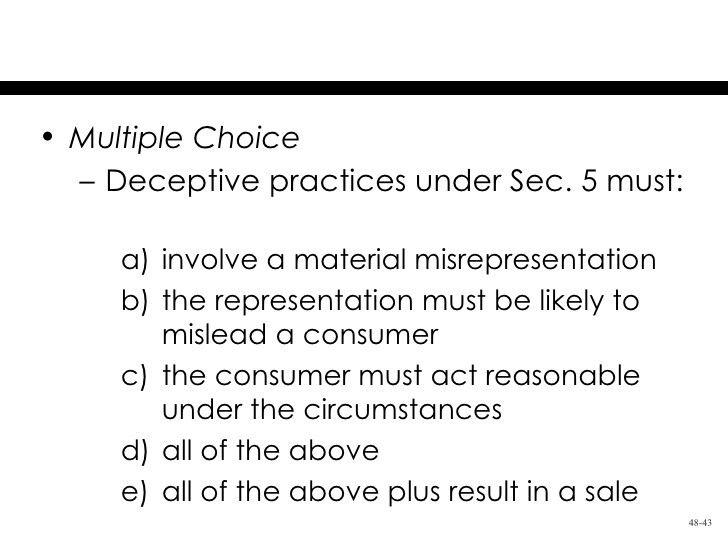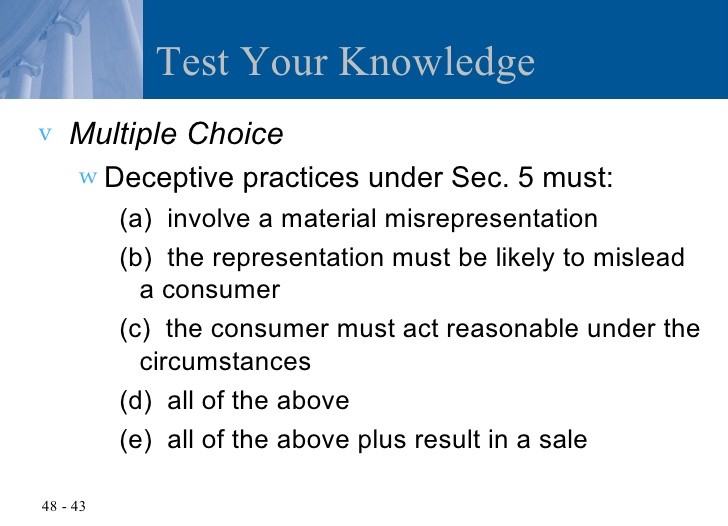What is the history of federal regulation for deceptive trade practices and consumer protection
Post on: 16 Март, 2015 No Comment

2 Answers | Add Yours
Posted February 1, 2014 at 3:38 AM (Answer #1)
Posted March 3, 2014 at 9:10 PM (Answer #2)
dislike 1 like
Consumer protection agencies have been established on state levels as part of state attorney general offices. These agencies are different from and unconnected with the federal and state agencies that regulate fair trade practices. Since the 1960s. each state has statutes regulating fair trade practices though the federal government, since 1914. legislates national fair trade practices relating to these areas of restrictions and prohibitions in business practices:
- unfair trade practices
- deceptive trade practices
- and unfair competition
It is the Federal Trade Commission that regulates federal, nationally imposed laws that prohibit specific practices in interstate commerce. The Federal Trade Commission (FTC) enacted the Federal Trade Commission Act of 1914 (FTCA). The FTCA was the first and original federal statue nationally prohibiting unfair or deceptive trade acts or practices. It has been amended over the years to keep abreast with changes in the business and trade environments.
The original aim of the federal FTCA statute related to antitrust legislation and trademark infringement legislation. In contrast, prior to the 1960s. state statues related to unfair competition.
unfair competition: common law tort action for practices employed by businesses to confuse consumers as to the source of a product. passing off its goods as those of another. [through] trademark infringement. (Encyclopedia of Everyday Law. Gale Cengage ).
Despite the FTCA, which was designed to regulate unfair or deceptive trade acts or practices, standards throughout the states of what legal actions rightly applied to unfair or deceptive trade acts or practices were undefined and unclear. To address the problem of lack of definition of appropriate legal action and to provide uniformity throughout the states, theВ National Conference of Commissioners on Uniform State Laws (NCCUSL) drafted the Uniform Deceptive Trade Practices Act in 1964. which was revised by the NCCUSL in 1966. The intent of the Act of 1964/1966 was to remove from state law unnecessary restraints against common law action in tort courts (as as are used for action in unfair competition) for cases of deceptive trade practices.В
Uniform Deceptive Trade Practices Act of 1964: designed to bring state law up to date by removing undue restrictions on the common law action for deceptive trade practices. (Gale Cengage )
Eleven states accepted the Act of 1964 for their own statutes while the others composed their own statues based on the language of the Act. States had uniformly compatible statutes governing deceptive or unfair trade practices by the 1970s. Not all possible situations of deceptive trade practices are covered by federal or state statutes. Most statutes are limited in scope to commercial transactions involving a consumer purchasing or leasing goods or services for personal, household, or family purposes (Gale Cengage ). The specific language of the rights asserted or limited in statutes is often the subject of litigation—lawsuits brought about challenge the authority of the language and the applicability of it to trade situations. As a result, most states require liberal interpretations of the statutes since not all deceptive trade situations are defined or specifically addressed.
Categories of State Limitations Regarding Applicability of Deceptive Trade Statutes
Trade or Commerce: generally excludesВ trade between non-merchants and similar transactions; includes a broad range of profit-oriented transactions.
Consumer Transactions: consumer is defined as a person who will use a good or service for personal, family, or household purposes; applicability of definition of consumer is subjected to a subjective test (intent at time of transaction) and an objective test (typicality of transaction for consumers).
Goods and Services: defined under the Uniform Commercial Code (UCC) as those items that are movable at a time of purchase; cows are goods, acting on another’s behalf is a service, etc; additional definitions include the provision that goods/services be involved in a transaction (exchange of consideration); additional definitions include merchandise, which incorporates goods, services, real property, commodities, and some intangibles.
Prohibited Acts and Practices: this is a specific prohibition against fraudulent practices and unconscionable practices; on the federal level, the Federal Trade Commission (FTC) requires that an individual have the capacity [or tendency] to deceive or commit an unfair trade practice; if the FTC rules that this capacity or tendency exists [this is different from having an intent of an act or having committed an act of deception], this may be enough for the FTC to order that the company to cease and desist the deceptive or unfair practice; states follow the FTC and disregard intent, full knowledge, and committing an action.
[The above taken from Encyclopedia of Everyday Law. Gale Cengage .]
Consumer Action Against Deceptive Trade

- Consult the applicable State Deceptive Trade Statute
- Consult case law applying the statute
- The Uniform Deceptive Trade Practices Act of 1964 list specific actions constituting deceptive practices such as passing off goods or services as those of another company, causing the likelihood of confusion or of misunderstanding, misrepresenting that goods or services are of particular standard, making false or misleading statements of fact, etc.
Other Practices Deemed Deceptive or Unfair
Debt Collection: the Federal Fair Debt Collection Practices Act of 1996 (FFDCP) governs abuses in debt collection; FFDCP may cover debt collections that other debt collection laws do not cover; may cover third-party debt collections; may cover false debt solution proposals.
Breach of Warranty: FFDCP may cover deceptive practices with respect to the advertisement or negotiation of a warranty.
Insurance: FFDCP may cover deceptive practices of insurance companies related to the sale of policies and the payment of claims.
Pyramid Schemes: state statutes may cover financial schemes by which investors make money by recruiting others to join and invest in a company rather than by selling a product claimed by a company.
State and Local Provisions
While most states have analogous (comparably similar) statutes and restrictions, there are variations in the different states. While consulting the FFDCP is important, it is also important to consult your state statutes to know the particular differences addressed by your state’s regulations. For example, while Alabama prohibits 22 specific practices, Alaska prohibits 41. California and Arizona both require intent of deception and Delaware requiresВ likelihood of a misunderstanding on the part of a consumer while the FFDCP does not require intent. Illinois and Iowa prohibit concealment or omission by a business of any material fact with intent. Missouri statutes apply to the sale, offer for sale, or advertisement of any merchandise while Montana statutes apply to any real or personal property, services, intangibles, or anything of value. While there is a good deal of uniformity, there are state related differences that the consumer will want to consult while taking action against deceptive practices.
History of Federal Regulation for Deceptive Practices
1914: Federal Trade Commission (FTC) enacted the Federal Trade Commission Act of 1914
1914-1950s, state statutes: related to unfair competition.
1964: National Conference of Commissioners on Uniform State Laws (NCCUSL) drafted the Uniform Deceptive Trade Practices Act of 1964
1966: Uniform Deceptive Trade Practices Act amended
1960s-1970s: states enacted uniformly compatible statutes governing deceptive or unfair trade practices; incorporated prohibitions for consumer protection
1996: Federal Fair Debt Collection Practices Act (FFDCP)
Source : Consumer Issues — Deceptive Trade Practices. Encyclopedia of Everyday Law. Ed. Shirelle Phelps. Gale Cengage. 2003.














